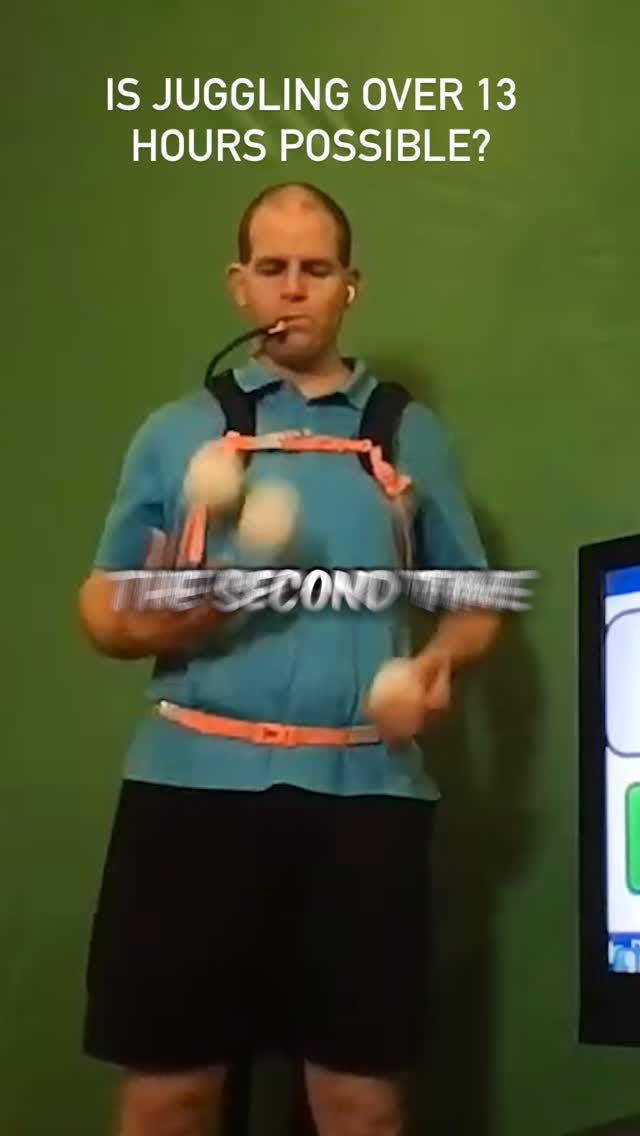It's time to drop the ball
Lessons from juggling life
I looked it up. The world record for juggling three balls without dropping them is 13 hours, 10 minutes, and 5 seconds. It was set by David Rush in 2023, an MIT graduate who has broken over 250 Guinness World Records and calls this particular feat “the hardest record I’ve ever broken.”
David Rush specializes in three-ball cascade juggling (the most basic juggling pattern that forms the foundation of all juggling). He failed three times before succeeding. On his first attempt, he had to stop after 3.5 hours when his wife went into labor. On his second, he made it 10 hours and 53 minutes before two balls collided. On his third attempt, he juggled for 10 hours and 27 minutes before a ball unexpectedly hit the floor, and he couldn’t even figure out what went wrong.
Even someone who has dedicated his career to perfecting the most basic juggling pattern (and who holds multiple world records for speed, endurance, and precision) eventually drops all the balls. He has to put it down.
So why do we expect ourselves to keep everything in the air indefinitely?
You can’t do more than 3
Randi Zuckerberg, former Facebook executive, has a name for this impossible juggling act: Work, Sleep, Family, Fitness, Friends - Pick Three.
That’s it. Not all five every day. Just three.
This framework went viral because it names what we all experience but rarely admit: you literally cannot do everything well simultaneously. My friends at Alive and (un)Well BFFs recently wrote about The myth of doing it all, sharing how they’re all “floundering at all of it” in different ways. Ash Duskwood described how “it’s not even that I’m struggling to do it all, it’s that I’m struggling to do anything well.” Jess admitted, “I kind of half ass it all” because the alternative (perfectionist management of chronic health conditions) is utterly exhausting.
What if you can’t even pick one?
When you live with invisible illness, chronic pain, or mental health conditions, some days, even picking one might not be possible. Some days, just surviving and making it through the hour or the day is an achievement.
The framework still holds (modified for the Barely Making It club). Your “three” might now look like: rest, medication, and breathing through the hard moments.
The point is, we don’t actually just have three neat categories to choose from. Health isn’t ONE thing. You’re juggling mental health with physical health while getting the lunch box ready for your kid who’s rolling on the floor wearing black where the dog just shook fur everywhere (true story). You’re managing sensory overload, medication timing, work deadlines, and trying to remember if you ate today.
Being in a loud environment might bring you down so completely that you can’t pick anything from the traditional list. But you’re not “not picking anything.” You’re picking self-stabilization, recovery, baselining. You’re choosing survival mode, sensory regulation, and damage control. That’s still picking three things. And let’s be honest, in reality, we’re always juggling more than that, which is why we keep dropping.
Professional jugglers prove this point. The record for four balls is just 2 hours and 46 minutes. For five balls, 3 hours and 44 minutes. For seven balls, only 16 minutes. The most balls ever juggled? Eleven, lasting less than a minute.
The more you juggle, the more you drop, and the quicker you drop them. This is not failure or lack of skill. It is just physics.
The art of strategic dropping
Unlike David Rush juggling actual balls, we’re juggling work deadlines and family time, health appointments and household chores, relationships and personal dreams. And somehow we expect to keep all these balls in the air for decades without breaks or failures.
When we drop balls, we spiral into shame. We apologize endlessly and promise it won’t happen again. But what if we treated dropped balls as inevitable and strategic?
Rubber balls bounce back: Messy house, delayed emails, missed workouts, and takeout dinners
Glass balls shatter: Your health, important relationships, and core values
The goal is to be intentional about your pick.
What gets your energy today? And what can wait?
Just be human!
David Rush’s record is extraordinary precisely because it’s impossible to sustain. Even with MIT-level planning and years of practice, he hit human limits. We don’t expect ourselves to run marathons daily, yet somehow we expect superhuman life management.
You have permission to pick three priorities, let non-essential tasks slide, ask for help, and recognize that dropping balls doesn’t make you a failure. Maybe the most radical thing we can do is stop trying to be superhuman jugglers and accept that being human means some balls will always fall.
The real skills? Learn what matters most, recognize when you’re juggling too much, be strategic with your energy, and forgive yourself for having human limits.
What balls are you trying to juggle right now? Which three deserve your energy today?






Admittedly, I am trying to juggle more than I should. It just feels so impossible for me not to do more than my body can handle because I haven't fully allowed myself to accept that I am more disabled than I want to admit. I blog for a living, I make art as a side gig, I'm a mom, wife, homemaker, and worrier, and oh ya, I'm severely chronically ill to boot.